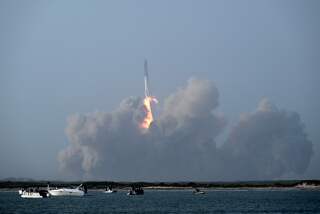SpaceX Falcon 9 rocket grounded ahead of historic space walk mission

- Share via
SpaceX’s reusable Falcon 9 rockets have been grounded by the Federal Aviation Administration for the second time in two months after one of them caught fire, fell over and exploded upon its return to Earth this week.
The decision by the agency could further delay the historic Polaris Dawn mission, which will feature the first space walk by civilians. The crew, in a SpaceX Dragon capsule, will be sent to space by a Falcon 9, the company’s workhorse rocket.
The five-day mission was originally set to blast off Monday but has been delayed repeatedly for various reasons, including a leaking launch-pad helium line and unfavorable weather off the coast of Florida, where the capsule will splash down on its return.
The Falcon 9 that failed blasted off early Wednesday morning from the Cape Canaveral Space Force Station and launched 21 satellites into orbit as part of SpaceX’s Starlink constellation, which provides space-based internet service.
The second stage of the rocket burned up in the atmosphere as planned, while an engine that is part of the first-stage booster reignited to power a controlled landing on an uncrewed barge in the ocean. Video of Wednesday’s flight shows the returning stage touching down on the ship and falling over while partially engulfed in flames.
SpaceX said that the first stage had completed 22 launches and returns before the accident. The mishap also ended a streak of 267 successful returns for the Falcon 9 program, which has sharply lower launch costs due its reusable stage.
In announcing the grounding, the FAA noted Wednesday that although “no public injuries or public property damage have been reported,” it was “requiring an investigation.”
Last month, the Falcon 9 was grounded for two weeks after the second-stage engine misfired mid-flight because of what was later determined to be a liquid oxygen leak in a line leading to a pressure sensor. The mishap occurred July 11 during an attempt to launch a payload of 20 Starlink satellites. The satellites did not reach their intended orbit and burned up in the atmosphere.
The Falcon 9 has been crucial in establishing SpaceX’s Starlink satellite broadband network. It also handles commercial payloads and launches the company’s Dragon capsules, which carry cargo and astronauts to the International Space Station.
The Falcon 9 has launched a total of 365 missions, according to SpaceX.
The Polaris Dawn mission is being funded by Jared Isaacman, a fintech billionaire who will serve as commander of a crew of four, including two SpaceX employees. On their third day in space, Isaacman and a second crew member are scheduled to carry out the first commercial space walk.
They will be testing a new generation of mobile space suits that SpaceX says will be necessary to colonize the moon and Mars.
The Falcon 9 also is scheduled next month to launch a Crew Dragon capsule to the International Space Station, where two NASA astronauts have been stranded since June due to problems with Boeing’s Starliner spacecraft. They are scheduled to return to Earth on the Crew Dragon in February.
More to Read
Inside the business of entertainment
The Wide Shot brings you news, analysis and insights on everything from streaming wars to production — and what it all means for the future.
You may occasionally receive promotional content from the Los Angeles Times.











